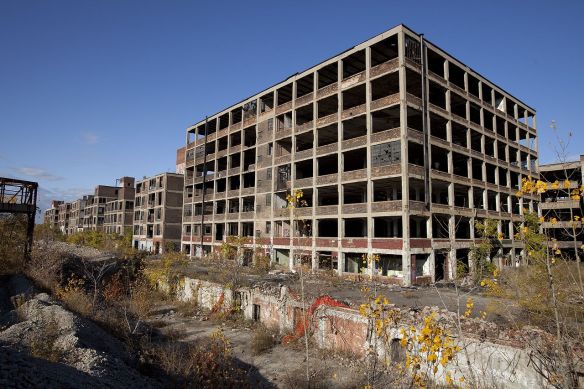More alike than you think?
The Chronicle of Higher Education has a diverting piece on what cities can teach Higher Education. Essentially the argument is that there are many similarities and that a long term view is necessary to deliver success:
Cities and colleges are more alike than people think. Both are considered economic engines that also offer rites of passage and an escape from parochialism. Both host sports teams and their own police forces. Recently the overwhelming debts run up by cities and by students have forced themselves on the public’s attention. Yet despite the significant woes of Detroit and the impending bankruptcies of other American cities, no one is expecting urban living to disappear or be radically transformed. Higher education, however, is not so lucky. Some doomsayers predict the rise of a completely online educational system, spurred by the spread of massive open online courses.
 Universities really don’t want to be like Detroit
Universities really don’t want to be like Detroit
But perhaps one of the most interesting elements is made in relation to the student facilities “arms race”. The piece quotes a recent report which found that there are nearly 160 leisure-and-recreation projects under way on US campuses, representing an investment of some $1.7-billion:
Should we blame students for the party atmosphere on many campuses? That might be tempting, but it ignores the “Club Ed” ambitions of some presidents. Dorms, in many cases, have become full-scale resorts. What is a student to think when seeing, for instance, Texas Tech University’s leisure pool and “lazy river”?
See this recent post on this topic for more on campus facilities. But the real issue here is about looking at the big picture and not being distracted by short term issues:
Cities have also invested in projects that were meant to attract people yet do nothing to encourage the social drama that is the real attraction of cities. We must remember, however, that successful cities are not always the most efficient—that is, efficient in a hasty way. New York has, along with London, some of the most expensive real estate in the world tied up in parkland. Should Central Park be sold off to pay the city’s debts? No, there is more to a city than balancing a budget and more to balancing a budget than balancing it in one year. Whatever gains might be achieved by the quick sale of parkland would be offset by the long-term erosion in quality of life.
Just so with higher education. Philosophy and art may have no direct relation to a job qualification, but an education without them is as soulless and inhumane as the housing projects that were inflicted on generations of the poor.
Much to learn then perhaps.












